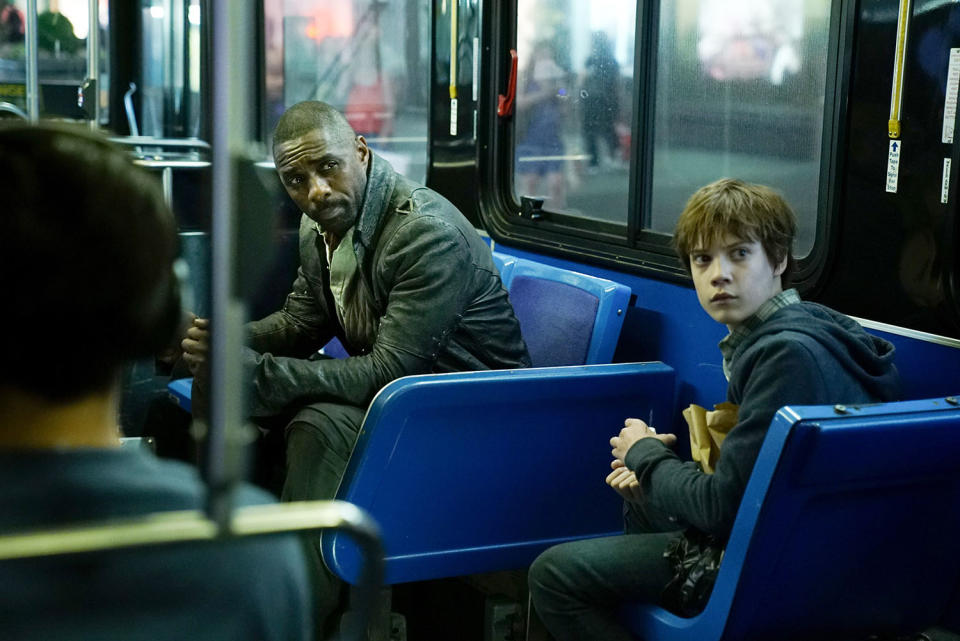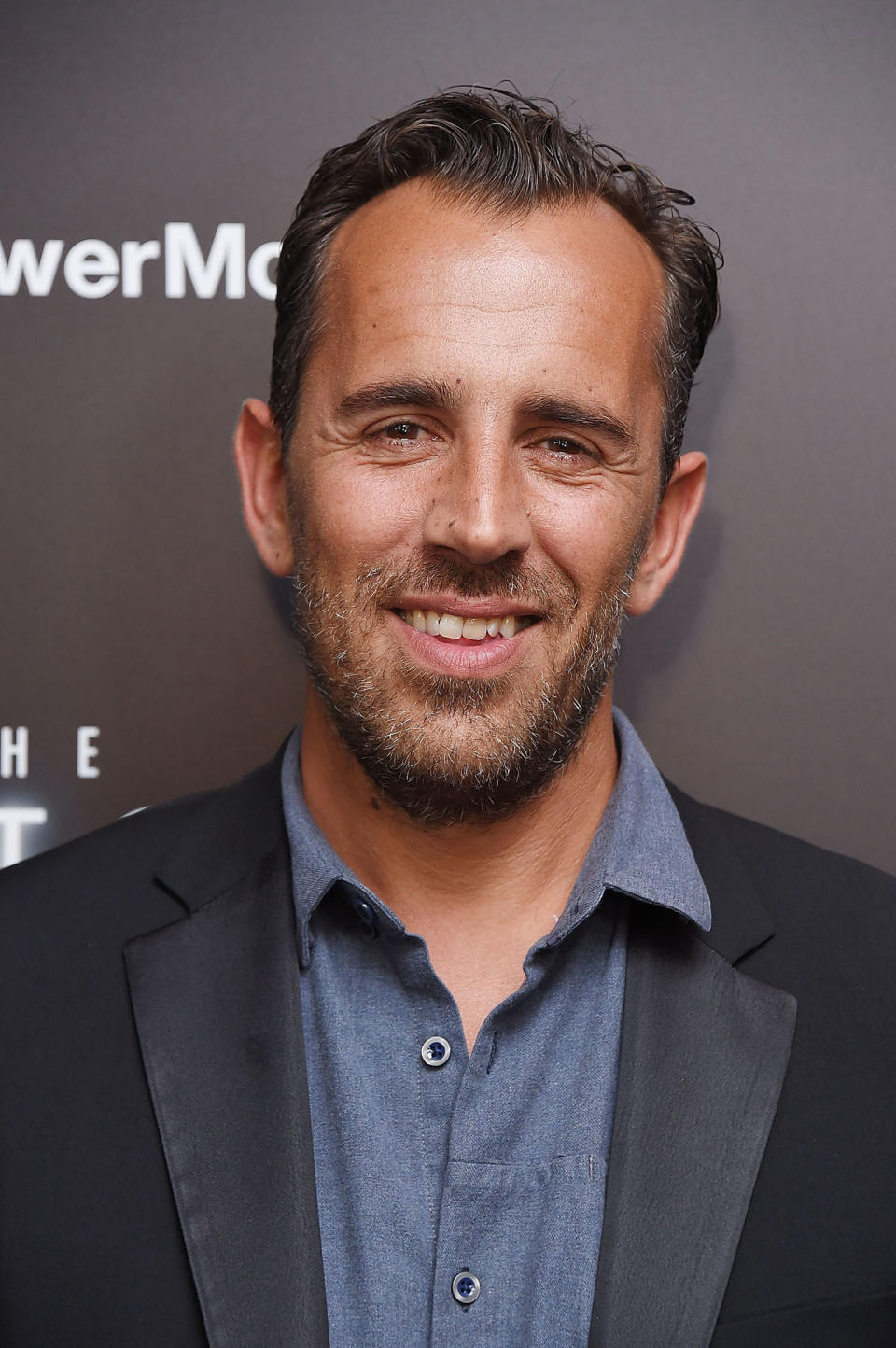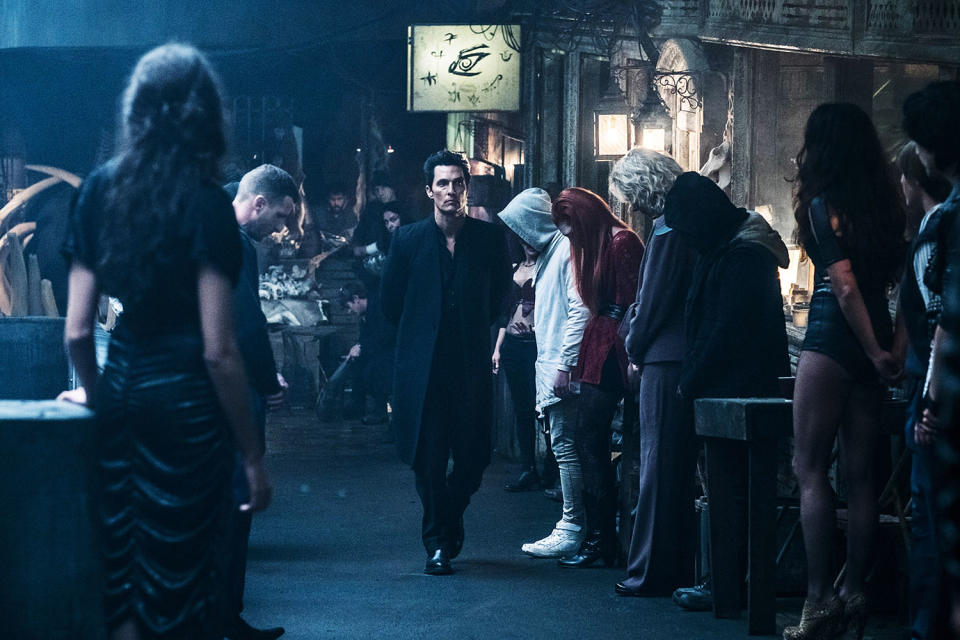'Dark Tower' director Nicolaj Arcel on what did and didn't make it into the film (Spoilers!)

Warning: This post contains major spoilers for the film version of The Dark Tower
Fans of Stephen King‘s beloved Dark Tower book series have spent a solid decade anticipating a film version of the author’s magnum opus, only to see those plans repeatedly collapse like a house of cards. And Danish director Nicolaj Arcel experienced that disappointment right along with them. “I’m a massive fan of the novels and have been since I was a teenager,” Arcel tells Yahoo Movies. Unlike other fans, though, the filmmaker was given the opportunity to make the movie a reality. In April 2016, he stepped into the director’s chair previously almost occupied by the likes of J.J. Abrams and Ron Howard and called “Action” on the first entry in a potential franchise that could include additional sequels and a TV series.
Even though he was making his Hollywood debut with a big-budget film overseen by such established producers as Howard and Akiva Goldsman, the self-described “uber-geek” says he enjoyed a certain amount of creative control in crafting a Dark Tower movie that he and fellow fans, as well as mainstream audiences, would want to see. “One of the big things that the studio will always be concerned about with any kind of brand is, will people understand it who are not fans,” Arcel explains. “So I had as much creative control as anybody would have on a film like this.” In this spoiler-filled conversation, we talked with Arcel about the bits of Dark Tower mythology that didn’t make the final cut and the one Stephen King reference he couldn’t include in the film.
One thing that jumps out right away about the film is that this version of The Dark Tower is framed as Jake’s story rather than Roland’s, which is a very fundamental shift in the narrative’s point of view. Was that a deliberate choice on your part?
When I got on board, Akiva Goldsman had already written the script. It was his choice, and Ron Howard’s possibly. They ended up going with the idea of, “Let’s enter this world through Jake. Let’s make it Jake’s story.” That was a choice they made, and it was part of the reason why I got excited about it when I read it. I saw that this version was different from the novels I read, but I also got the world and the characters, so I understood why they began the story like this. It’s an introduction to the saga — it’s not supposed to be the whole saga in 95 minutes.

The first book in the series, The Gunslinger, is very different from what the first film ends up being. It’s a dystopian western, and the movie has very few of those western elements in it. Did you want to incorporate more of that genre into the film initially?
We had to make a conscious choice. The first novel is a western, there’s no escaping that. But the other books are not westerns; they are fantasy sci-fi adventure novels, some of which take place in modern-day New York and are kind of gangster-y. So we had to make the choice of saying, “What is the genre of this movie series?” And the choice was that it’s a fantasy sci-fi adventure. If we started out doing a western and people saw that and liked it, but then the second one was nothing like a western, everybody would be like, “What’s wrong? I thought this was a western.” They would be so confused. So we tried to combine everything that we love about the novels into the world, and introduce that idea to the audience. But I do miss some of the western style.
How did you settle on the visual tone of the film, especially since there are so many genres at play?
I thought that the most important thing for me was to keep it grounded. That’s the world I come from, the European cinema. I was very concerned about making it feel real. Obviously, there’s some pretty crazy stuff in there; there’s magic and gunslinging and monsters and other worlds. But it’s not over Hollywood-ized. I tried to shoot on real locations and all that.
Stephen King has said over the years that he based Roland on Clint Eastwood‘s Man with No Name character from Sergio Leone’s spaghetti westerns. Were there movie gunslingers that you and Idris Elba looked to while creating your version of the character?
Interestingly, we didn’t go to other movies when we were talking about it. We talked a lot about soldiers with PTSD and veterans of traumatic experiences. What are they like? What is their state of mind? How do they internalize all the troubles they’ve been through and try to get past that? With Matthew [McConaughey], it was a little more playful. He was immediately like, “This is kind of the devil, right? I’m just the devil?” I was like, “Sure, it’s the devil.” So we had a lot of fun with that. He was really happy to just be able to play evil, because a lot of villains always have a reason [for their actions]. I thought it was refreshing that the Man in Black is just evil.

The Dark Tower book series is connected to all of Stephen King’s other novels, and the movie features several shout-outs to stories like The Shining and The Stand. Was it difficult to incorporate those into the film because of rights issues?
I had a team of people who were helping me figure this out. I would say, “Can I do this?” They would say, “No.” Then I’d say, “But can I do this?” They’d say, “Yeah, you can do that.” There was a lot of that back-and-forth, and I spent a lot of time on that, because it was very important to me. One of the things that I love about The Dark Tower is how it connects all the other Stephen King worlds and novels into this one saga, so it was important to me to get that right. Even if some of it is on the edge of what’s legal — and I don’t know if it is, but even if it was — I’m pretty sure that the people behind these other properties are going to be like, “This is cool. He’s just making a commercial for our film now!”
Was there a reference you wanted to include but couldn’t get permission?
I couldn’t have a city sign reading “Salem’s Lot” for some odd reason. I wanted it to be on an old sign in Mid-World that they’d be driving by. That would have been cool, but I couldn’t do it. I don’t know why.
Is it going to be difficult for future movies to deepen those connections?
I don’t think so. Honestly, I think it’s going to be the opposite. What happens with movies like this is that the next one is made for more money, and they’ll be able to spend a little bit of dough. It’ll be like, “Can we buy the rights to this?” For us, it was more like a begging situation. And King himself is going to help; he might have done that once or twice [on this movie].
Did you meet King in person during the making of the film?
We had a lot of communication, but I haven’t actually met him in person because he stayed in Maine the entire time. He didn’t want to come to South Africa, which I can totally understand. It’s a very long plane ride and very grueling. But we communicated almost at least once a week throughout the entire production. It was very collaborative, and he was so cool.
Fans will obviously be watching very closely for the Horn of Eld, which signals that this is a sequel to the book series. It is on Roland’s person in the film, but it’s not directly referenced at all. Is there a deleted scene that explained its importance to the mythology?
No. That was one of the things where, as a fan, I would have felt it was cool to do a scene where he picks up the horn and says, “This is what I need. It was left on the fields of Jericho Hill.” But it’s a case where the studio probably came in and said, rightfully, “Nobody who has not read the novels will know what this scene is about.” It’s just going to be weird to hear them talking about the horn now and never again. And I totally get that. As the story hopefully continues, we’ll slowly build to the idea of what it is and why it’s important. Now it’s simply there.
Similarly, the “Crimson King” — another important part of the story — is referenced only in background graffiti.
That was actually suggested by Stephen King himself. During the editing, there were one or two references to the Crimson King and I asked him, “Do you think we should keep it visual and wait a little bit?” He was like, “Totally.” Because that’s what he does in the first novel too. He doesn’t even mention the Crimson King until later.
The 95-minute runtime did cause some consternation among fans. Did you understand that reaction?
If I hadn’t directed it, I would also have been going, “95 minutes? How in the hell? What’s wrong?” What I’ve hopefully been able to explain in these interviews is that we’re meeting the three characters and are going on from here. I was actually happy this film was on the short side. My last film, The Royal Affair, was too long in my view. Every time I see it, I go “I could have just cut out 15 or 20 minutes!” [Laughs]

Is there a longer cut?
The early cut of The Dark Tower was maybe 12 minutes longer. On the DVD there’s going to be like five or six minutes of deleted scenes, which I felt kept the pace a little slow. There is some fan service stuff in there too. There’s a little bit more about gunslinger lore and more about the Man in Black. There’s also more dialogue between Jake and Roland; at one point they come across this diner which is a little bit tall and deep. It’s a very short scene but fun to watch.
The later novels get very meta-textual; Stephen King even becomes a character in some of them. Would you try to replicate that in future films?
It would be great. I love that stuff, but King really doesn’t want us to have him be a character in the movie series. I think he asked Ron Howard personally to promise never to put him in it. So we won’t do it if he doesn’t want to. I also think it would be weird. If Stephen King shows up in the fourth film people would go, “What’s going on?” [Laughs]
‘The Dark Tower’: Watch a trailer:
Read more from Yahoo Movies:


